Nigerian banks face credit crunch and senior judges are accused of corruption
This week, a Dubai-based investment bank published a report stating that seven Nigerian banks are undercapitalized, i.e., they do not have sufficient funds to meet credit demands. As highlighted by the Flitch Rating agency, the banks are experiencing a sharp rise in non-performing loans—11.7 percent, a 6.4 percentage point increase between June 2015 and June 2016. The banks are currently running a deficit of $3.2 billion. The report states that the banks are currently experiencing a “full-blown financial crisis” as the country’s current monetary and fiscal policies have created a credit crunch. A representative from the Central Bank of Nigeria denied the claim, though, and stated that the challenges that are currently faced by the Nigerian banks are not specific to the country.
In its latest efforts to curb corruption in the country, Nigeria’s Department of State Services (DSS) seized $800,000 in cash during raids where they also arrested senior judges suspected of corruption. In a statement, the DSS voiced, “We have been monitoring the expensive and luxurious lifestyle of some of the judges as well as complaints from the concerned public over judgment obtained fraudulently and on the basis (of) amounts of money paid.” In response, the Nigerian Bar Association accused the authorities of conducting “Gestapo-style” operations and are demanding the release of the arrested judges.
On a brighter note, Thursday, the Nigerian government confirmed the release of 21 Chibok Girls, a result of negotiations between the Nigerian government and Boko Haram, mediated by the International Red Cross and the Swiss Government.
Côte d’Ivoire eases presidential requirements in the draft of its new constitution
On Tuesday, October 11, Côte d’Ivoire’s parliament approved a draft of its new constitution, which will go to popular vote on October 30. Of the changes in the new draft, the two most salient are the elimination of the requirement that both parents of a presidential candidate must be Ivorian and of the age limit for the president. Under the new draft, only one of the president’s parents must be a native-born Ivorian. This change is significant: According to Reuters, “Ivorian nationality was at the heart of a crisis that began with a 1999 coup and included a 2002-2003 civil war that split the country in two for eight years.” In 2010, a lack of clarity around now-President Alassane Ouattara’s father’s nationality had fueled incumbent President Laurent Gbagbo’s refusal to step down after he lost the elections. This refusal led to another civil war and the death of over 3,000 people.
The other major change—the elimination of the age limit of 75—opens the door for Ouattara (as well as former presidents Laurent Gbagbo and Henri Konan Bedie) to run in the next round of elections, scheduled for 2020. Many of those in the opposition, though, denounced the changes, arguing that they are “undemocratic,” especially since it will allow Ouattara to extend his stay in power, and that the process was not transparent.
Another major change is the creation of a vice president, who would take over the position of president if the president died or was incapacitated; previously the speaker of the parliament would rule for 90 days during which time an election would be organized. The new draft also creates a senate, one-third of whom would be chosen by the president and two-thirds of whom would be through an indirect election (details are yet to be determined).
South Africa’s President Zuma files interdict to prevent the release of anti-corruption report
As this week’s news of South African Finance Minister Pravin Gordhan’s impending court date sent the rand and financial markets reeling, President Jacob Zuma also made headlines as he halted the release of the preliminary findings from Public Protector Thuli Madonsela’s corruption investigation. Zuma’s spokesperson confirmed on Thursday that the president applied for a court interdict in the High Court in Pretoria, which will delay the report’s scheduled release on Friday, October 14. Madonsela stated, “He has applied for a court hearing on the interdict for Tuesday, October 18, making it impossible for me to release the report before then.” Leader of the Democratic Alliance opposition party, Mmusi Maimane, contends that the president’s interdict “shows that he is becoming increasingly worried about what is contained in this report and desperate to stop it from being made public.”
Madonsela’s investigation into Zuma focuses on the alleged influence of the Gupta family in the appointment of South Africa’s cabinet members and leaders of state-owned companies as well as the granting of state contracts. For instance, earlier this year, Deputy Finance Minister Mcebisi Jonas reported that he was offered the head of the Treasury position by members of the Gupta family shortly before former Finance Minister Nhlanhla Nene was fired last December, which destabilized the markets, and after a short stint by a relatively unknown policymaker, was replaced by the current minister Gordhan. Both Zuma and the Guptas deny allegations of wrongdoing. This most recent investigation follows Mandonsela’s 2014 probe, which found that Zuma used taxpayer money to refurbish his private residence, and consequently, he was forced to repay these funds earlier this year.
The Brookings Institution is committed to quality, independence, and impact.
We are supported by a diverse array of funders. In line with our values and policies, each Brookings publication represents the sole views of its author(s).

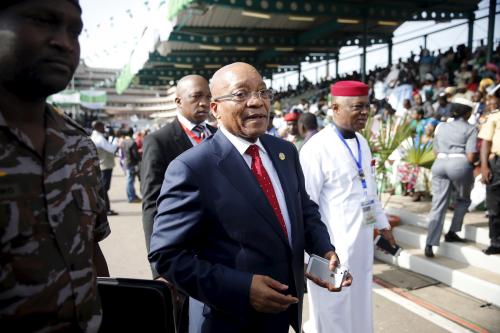
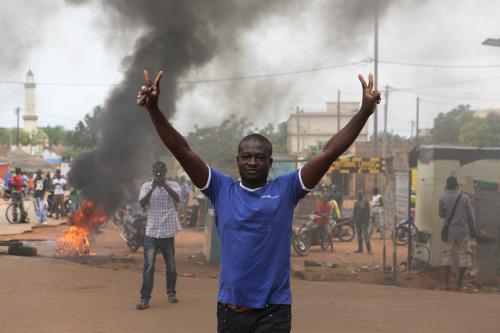
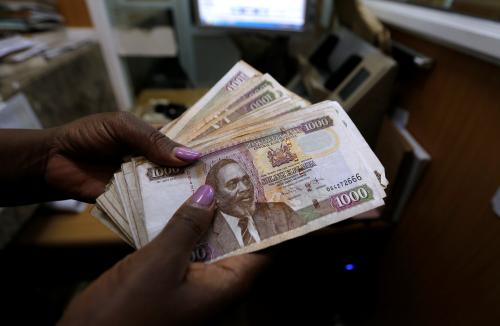

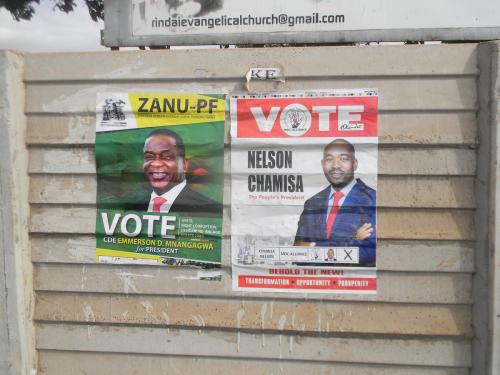
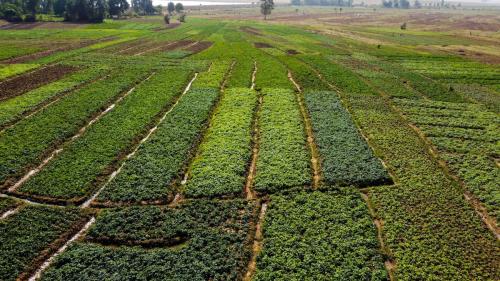

Commentary
Africa in the news: Nigeria’s credit crunch, Côte d’Ivoire’s constitution change, and South Africa’s political turmoil
October 14, 2016